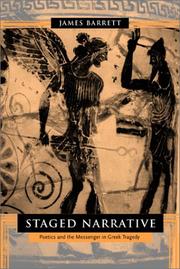| Listing 1 - 2 of 2 |
Sort by
|
Book
ISBN: 1503629406 1503628566 9781503629400 9781503628564 Year: 2021 Publisher: Stanford, California
Abstract | Keywords | Export | Availability | Bookmark
 Loading...
Loading...Choose an application
- Reference Manager
- EndNote
- RefWorks (Direct export to RefWorks)
"An incisive exploration of the way Greek myths empower us to defeat tyranny. As tyrannical passions increasingly plague twenty-first-century politics, tales told in ancient Greek epics and tragedies provide a vital antidote. Democracy as a concept did not exist until the Greeks coined the term and tried the experiment, but the idea can be traced to stories that the ancient Greeks told and retold. From the eighth through the fifth centuries BCE, Homeric epics and Athenian tragedies exposed the tyrannical potential of not only individuals but groups large and small. These stories identified abuses of power as self-defeating and initiated a movement away from despotism and toward broader forms of political participation. Following her highly praised book "Enraged," the classicist Emily Katz Anhalt retells tales from key ancient Greek texts and then goes on to interpret the important message they hold for us today. As she reveals, Homer's "Iliad" and "Odyssey," Aeschylus's "Oresteia," and Sophocles's "Antigone" encourage us - as they encouraged the ancient Greeks - to take responsibility for our own choices and their consequences. These stories emphasize the responsibilities that come with power (any power, whether derived from birth, wealth, personal talents, or numerical advantage), reminding us that the powerful and the powerless alike have obligations to each other. They assist us in restraining destructive passions and balancing tribal allegiances with civic responsibilities. And they empower us to resist the tyrannical impulses of others and in ourselves. In an era of political polarization, "Embattled" demonstrates that if we seek to eradicate tyranny in all its toxic forms, ancient Greek epics and tragedies can point the way"--
Mythology, Greek --- Greek drama (Tragedy) --- Epic poetry, Greek --- Power (Social sciences) in literature. --- Democracy in literature. --- Political aspects. --- Themes, motives. --- Aeschylus. --- Athenian tragedy. --- Homer. --- Homeric epics. --- Sophocles. --- ancient Greece. --- ancient Greek myths. --- democracy. --- tyranny.

ISBN: 0520231805 0520927931 9786612356582 1282356585 159734916X 9780520927933 0585419647 9780585419640 9780520231801 9781597349161 6612356588 9781282356580 Year: 2002 Publisher: Berkeley University of California Press
Abstract | Keywords | Export | Availability | Bookmark
 Loading...
Loading...Choose an application
- Reference Manager
- EndNote
- RefWorks (Direct export to RefWorks)
The messenger who reports important action that has occurred offstage is a familiar inhabitant of Greek tragedy. A messenger informs us about the death of Jocasta and the blinding of Oedipus, the madness of Heracles, the slaughter of Aigisthos, and the death of Hippolytus, among other important events. Despite its prevalence, this conventional figure remains only little understood. Combining several critical approaches-narrative theory, genre study, and rhetorical analysis-this lucid study develops a synthetic view of the messenger of Greek tragedy, showing how this role illuminates some of the genre's most persistent concerns, especially those relating to language, knowledge, and the workings of tragic theater itself. James Barrett gives close readings of several plays including Aeschylus's Persians, Sophocles' Electra and Oedipus Tyrannus, and Euripides' Bacchae and Rhesos. He traces the literary ancestry of the tragic messenger, showing that the messenger's narrative constitutes an unexplored site of engagement with Homeric epic, and that the role illuminates fifth-century b.c. experimentation with modes of speech. Breaking new ground in the study of Athenian tragedy, Barrett deepens our understanding of many central texts and of a form of theater that highlights the fragility and limits of human knowledge, a theme explored by its use of the messenger.
Greek drama (Tragedy) --- Messengers in literature. --- Narration (Rhetoric) --- Rhetoric, Ancient. --- History and criticism. --- History --- -Messengers in literature --- Rhetoric, Ancient --- Classical languages --- Greek language --- Greek rhetoric --- Latin language --- Latin rhetoric --- Narrative (Rhetoric) --- Narrative writing --- Rhetoric --- Discourse analysis, Narrative --- Narratees (Rhetoric) --- History and criticism --- Tragédie grecque --- Messagers dans la littérature --- Narration --- Rhétorique ancienne --- Histoire et critique --- Ancient rhetoric --- Messengers in literature --- achilles. --- aeschylus. --- ancient greece. --- ancient world. --- arete. --- athenian tragedy. --- bacchae. --- classicism. --- drama. --- electra. --- epic. --- epistemology. --- euripides. --- genre study. --- gods and goddesses. --- greek tragedy. --- hellenism. --- homer. --- homeric epic. --- hubris. --- human knowledge. --- literary ancestry. --- literary criticism. --- literature. --- messenger. --- mythology. --- narrative poetics. --- narrative theory. --- nonfiction. --- oedipus rex. --- oedipus tyrannus. --- oedipus. --- performing arts. --- persians. --- poetry. --- rhesos. --- rhetoric. --- rhetorical analysis. --- sophocles. --- theater. --- tragedy. --- tragic messenger.
| Listing 1 - 2 of 2 |
Sort by
|

 Search
Search Feedback
Feedback About UniCat
About UniCat  Help
Help News
News